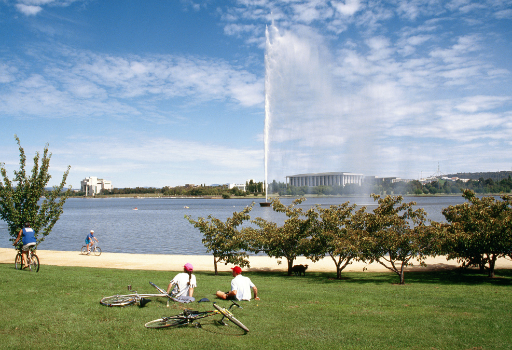How to Navigate Home Loans for Non-Residents in Canberra
Non-residents interested in buying a home in Canberra face unique challenges and opportunities. Whether you're an Australian expat, a foreign citizen, or a temporary resident, securing a home loan may seem tricky, but it's far from impossible.
Whether you're an Australian expat, a foreign citizen, or a temporary resident, securing a home loan may seem tricky, but it's far from impossible—especially with the help of a
skilled mortgage broker.
Brokers understand the ins and outs of non-resident home loans, which can save you time and reduce stress during the application process.
This guide breaks down the key information you need on how to secure home loans as a non-resident, including loan options, eligibility requirements, and updates on the Canberra property market in 2025.
What is the Outlook for Canberra Property Market in 2025?
Canberra’s property market remains resilient and continues to grow steadily in 2025. The median house price in the Australian Capital Territory (ACT) is currently around $920,000, while units and apartments are averaging $550,000 (CoreLogic).
These figures reflect the ongoing demand for housing, driven by Canberra's stable economy, a growing population, and limited housing supply.
Experts predict that property prices will see modest growth through 2024, with Canberra benefiting from the broader Australian housing recovery. The ACT Government has been actively encouraging population growth, particularly through skilled migration, which supports a strong rental market—a major advantage for investment property buyers.
Additionally, Canberra’s vacancy rate remains extremely low, hovering at 1.5% as of early 2024 (SQM Research). This indicates that properties, whether owner-occupied or investment properties, are in high demand.
The capital’s economic growth is largely driven by the public sector, with strong employment rates among government employees, making it an attractive location for steady rental income.
Why Canberra is Ideal for Non-Resident Homeownership and Property Investment
Canberra offers a unique advantage for non-resident buyers due to its steady property price growth, stable rental demand, and economic security.
For non-resident investors, the low vacancy rates combined with high rental yields make it an attractive location for investment property. Many foreign citizens and Australian expats are drawn to the city’s strong government-based job market, reliable infrastructure, and high quality of life, making it ideal for both homeownership and long-term property investments.
Additionally, Canberra’s well-regulated property market offers stability and transparency, ensuring a smoother home loan application process. For non-residents looking to invest in a low-risk market with steady appreciation potential, Canberra stands out among other Australian cities.
What Are the Eligibility Requirements for Non-Residents Home Loans?
Non-residents face stricter lending criteria than Australian citizens or permanent residents when applying for a home loan. However, securing a loan is still possible as long as you meet the necessary conditions.
Here’s a quick overview of the most important eligibility requirements for non-resident home loans:
- Visa Status: Lenders generally approve loans for temporary visa holders (e.g., Temporary Skill Shortage Visa, Partner Visa) or Australian expats. If you hold a temporary visa, ensure it’s valid for at least 12 months.
- FIRB Approval: Foreign citizens must obtain approval from the Foreign Investment Review Board (FIRB) before purchasing property in Australia. Australian expats and permanent residents are exempt.
- Larger Deposit: Non-residents typically need a 30-40% deposit of the property’s purchase price. Loan-to-Value Ratio (LVR) is often capped at 70%.
- Proof of Income: You’ll need to provide documentation proving a steady income source, whether from overseas or Australian employment. Lenders may require foreign income to be from an acceptable country.
- Good Credit History: A strong credit score is essential, and lenders will assess your credit history both in your country of residence and in Australia (if applicable).
- Stable Employment: Non-resident borrowers must show stable employment through employment contracts, business financials (if self-employed), and bank statements.
- Foreign Currency: If your income is in a foreign currency, lenders will assess the exchange rate risk, which may influence loan terms.
What Are the Additional Costs When Applying for a Non-Resident Home Loan?
Beyond the standard home loan costs, non-residents face a few extra expenses when buying property in Canberra. Here's a quick rundown of the additional costs you should budget for as a non-resident borrower:
- Foreign Investment Review Board (FIRB) Fees: If you're a foreign citizen, FIRB approval is required to purchase property. FIRB fees start at $6,350 for properties valued under $1 million and can go as high as $104,700 for properties over $10 million.
- Higher Deposit: As a non-resident, you’ll typically need a 30-40% deposit of the property’s purchase price, significantly higher than the standard deposit for local buyers.
- Stamp Duty: Stamp duty applies to all property purchases, and non-residents often face higher rates. In Canberra, expect to pay around $29,400 on a $700,000 property, but rates may vary (ACT Government Revenue Office).
- Lenders Mortgage Insurance (LMI): If your loan-to-value ratio (LVR) exceeds 80%, you may need to pay Lenders Mortgage Insurance. However, non-residents usually won’t qualify for loans with LVRs above 70%, which means you'll likely avoid this cost.
- Currency Conversion Fees: If you’re using foreign income, banks may apply currency conversion fees, adding an extra layer of cost to your repayments, depending on the currency fluctuations.
- Application Fees: Some lenders may charge an application fee ranging from $500 to $1,500, depending on the loan product and lender.
Types of Non-Resident Home Loans
When applying for a home loan as a non-resident in Canberra, your options depend on your residency status and financial situation.
Here's a breakdown of the most common types of loans available to non-residents, including foreign citizens, temporary visa holders, and Australian expats:
Loans for Foreign Citizens and Temporary Visa Holders
These loans are tailored for foreign nationals or those on temporary visas, such as a Temporary Skill Shortage Visa or a Student Visa. Lenders generally offer financing for up to 60-70% of the property's purchase price, requiring a larger deposit.
FIRB approval is mandatory for most foreign citizens.
Loans for Australian Expats
Australian expats living abroad can often access the same home loan products as local citizens, but the lender may factor in foreign currency risks when determining loan terms.
Permanent residents typically face fewer restrictions, and their deposit requirements are more in line with those of Australian citizens.
Loans for Temporary Residents
Temporary residents (e.g., on a Partner Visa or Work Visa) may qualify for non-resident home loans with a larger deposit—often around 30-40%. While loan options are more limited, it's still possible to secure a loan with the right documentation and proof of income.
Variable Rate Loans
The variable rate loan type has a flexible interest rate that rises and falls with the market. Non-residents benefit from the option to make additional repayments but need to be prepared for potential rate increases.
Fixed-Rate Loans
With a fixed-rate loan, you can lock in your interest rate for a period of 1 to 5 years. This is a good option for non-residents wanting certainty in their loan repayments, especially when dealing with fluctuating currencies.
Interest-Only Loans
Ideal for investment property purchases, these interest-only loans allow you to pay just the interest for a specified period, typically 5 years. While initial repayments are lower, you’ll still need to pay off the principal, which can lead to higher payments later on.
SMSF Loans
For non-residents who have set up a Self-Managed Super Fund (SMSF), an SMSF loan allows the fund to borrow money to invest in residential or investment property. These loans come with strict rules and higher requirements.
Low-Doc Loans
For non-residents with complex financial situations or insufficient documentation,
low-doc loans provide a more flexible option. However, interest rates may be higher, and lenders will assess the risk more stringently.
Case Study: Navigating a Home Loan as a Temporary Resident
John is a British national on a Temporary Skilled Work Visa in Canberra. He wants to purchase an investment property. As a temporary resident, he faced stricter lending requirements and a higher deposit. Initially, he struggled with financing options.
However, after providing his employment contract and bank statements, he secured financing for 70% of the property's value. Working closely with a broker, John navigated the process smoothly and secured a property worth $750,000.
Key Factors to Consider to Get Approved for Non-Resident Home Loans
When applying for a non-resident mortgage loan, lenders have stricter requirements compared to loans for residents. Here's what you need to keep in mind:
1. Residency & Visa Status
You’ll need a valid visa, whether you’re a non-permanent resident, temporary worker, or foreign buyer. Having permanent residency makes approval easier, while temporary visa holders often need to provide additional documentation about their legal residency status.
2. Income Documentation
Proof of stable income is key, including employment verification, income tax returns, and monthly income stream. Non-residents may need to provide foreign tax returns, international credit reports, and evidence of foreign income.
3. Property Type & Usage
Non-resident loans often vary by the type of property (e.g., primary residence, rental properties, or single-family homes). Loans for rental properties or investments usually have stricter terms.
4. Social Security & Tax Returns
Some lenders may require a Social Security Number, while others accept Foreign Social Security equivalents. Accurate tax returns are a key part of your application.
5. Additional Documentation
Non-residents must provide additional documents like foreign credit reports, employment contracts, and proof of foreign investments.
6. Experienced Lender
Working with loan specialists such as Home Loan Brokers Canberra who understand non-resident lending is essential. An experienced lender can guide you through the loan process and offer competitive rates or flexible terms.
FAQs
Can non-residents buy property in Canberra?
Yes, foreign borrowers and international borrowers can purchase real estate in Canberra. However, they will typically need approval from the Foreign Investment Review Board (FIRB)—a critical step for most foreign borrowers.
What is the typical deposit for non-resident loans?
Non-resident potential borrowers generally need a 30-40% deposit, depending on their financial status and current residency status. This is often part of the stricter basic requirements for foreign borrowers.
Are non-resident loans more expensive?
Yes, non-resident loans tend to come with higher interest rates and stricter mortgage terms. Private lenders may also charge higher rates, especially if alternative documents or flexible repayment period options are needed.
Can I use overseas income for my loan application?
Yes, but it must meet the income requirements of the lender. Proof of credit, previous income, and income potential will be assessed. Only income from acceptable countries that meets the lender’s credit verification standards will be considered.
Do I need FIRB approval?
Yes, foreign nationals and temporary visa holders typically need FIRB approval, especially if they’re looking at buying residential property, vacant land, or an investment mortgage. This is a critical step in the loan process.
What types of properties can I buy as a non-resident?
Non-residents can purchase a wide range of properties, including residential property, investment properties, and vacant land. However, the type of loan and loan programs available may vary depending on the property and your lawful residency status.
How long does the loan approval process take?
The mortgage approval process can take several weeks. The exact period of time depends on how quickly you can provide the required documentation requirements (such as proof of income and income tax returns) and meet the lender's minimum credit score requirement.
Some private lenders may offer faster processing, but they may also require extra steps, such as a balloon payment or stricter payment options.
Conclusion
Purchasing a home as a non-resident in Canberra is an exciting opportunity that can open the door to a solid investment or a new place to call home.
With the right knowledge and preparation, you can find a loan that suits your needs, whether you’re a foreign buyer, temporary resident, or Australian expat.
Our team is here to help you every step of the way. If you’re ready to take the next step or have more questions about non-resident home loans, reach out to us at 02 6173 6397 or visit Home Loan Brokers Canberra website to get personalised advice and expert assistance today.

CONTACT US
Call us today on 📞 (02) 6173 6397
We're Home Loan Broker Canberra, your local Mortgage Brokers and part of the much loved Loan Market Canberra team. See our 500+ reviews!
Find our offices on Google maps:
32 Cohen St, Belconnen ACT 2617
146 Scollay St, Greenway ACT 2900
1/32 Lonsdale St, Braddon ACT 2612
HANDY LINKS
All Rights Reserved. SEO by Copyburst



